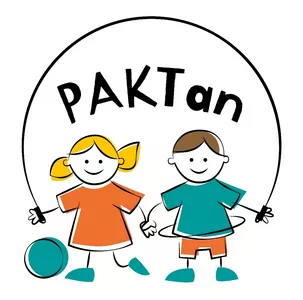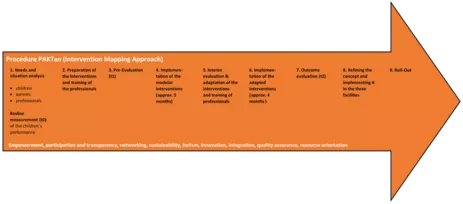PAKTan
Using physical activity in Kitas in an age-appropriate way - reducing health inequalities in Kitas of the AWO Oberbayern
The chances of growing up healthy are unequally distributed for children, and the health of children in Germany is also strongly dependent on their social situation. Today, Kitas reach a large proportion of children and their parents and, as the first stage of our education system, are an ideal place for early, age-appropriate health promotion and prevention. This is where the project "PAKTan" of the Faculty of Sport and Health Sciences of the Technical University of Munich (TUM) and the Arbeiter Wohlfahrt (AWO) Oberbayern comes in. "PAKTan" is dedicated to improving equal health opportunities for children in the Kita environment, with a particular focus on promoting physical activity in addition to promoting development.
Summary
PAKTan aims to support healthy behaviour and create health-promoting conditions in the Kita environment and is targeted in particular at all children and professionals in the two participating facilities of the AWO Oberbayern.
The aim is to integrate health and physical activity as fixed components of the day-care centre culture. To this end, interventions that promote health and physical activity, which combine measures of both condition oriented and behavioural prevention, are designed and developed in a participatory and needs-oriented manner together with the local stakeholders. At the same time, the professionals are strengthened in their health competencies through in-process training.
Within the project period of PAKTan, the quality and effectiveness of the interventions will be evaluated and a long-term integration in the two participating facilities of the AWO Oberbayern will be ensured. At the same time, a concept is being developed for further dissemination across the facilities and for sustainable transfer.
Funded within the Bavarian State Framework Agreement on Prevention by the AOK Bayern - Die Gesundheitskasse, the BKK Landesverband Bayern, the IKK classic, the KNAPPSCHAFT, the SVLFG, the Verband der Ersatzkassen as well as the Bavarian State Ministry of Health and Care and the LRV Bavarian Office.
Background
In a comparison of poverty groups in Germany, children are most often affected by or threatened with poverty, which is significantly associated with their social situation. The social situation is strongly related to the health of children affected by poverty due to a variety of interactions. Poverty and the resulting difficult social situation have a negative impact on health. Thus, the early course is set for health in later life. An essential aspect in this context are unfavourable health behaviours, such as lower physical activity. Overall, this means that health opportunities and a healthy upbringing are unequally distributed for children in Germany. In the selected Kitas of the AWO Oberbayern, the four central life situation dimensions (material, cultural, social, health) are also differently pronounced among the children, which significantly influences their life situation.
More and more children in Germany are being cared for in Kitas. As the first stage of the education system, Kitas are a key factor in early, age-appropriate health promotion, where all children can be reached, including those who are socially disadvantaged. In this way, children can be accompanied by professionals at a crucial stage of their development, which brings with it considerable opportunities to promote healthy development.
So far, however, physical activity and health promotion is not a compulsory part of the training of educators. In this respect, more needs-based concepts are necessary in order to be able to make better use of the opportunities of the living environment "Kita" in the improvement of health and social opportunities for children in the future.
Given the positive interplay between physical activity, motor performance, cognitive and social-emotional development and health, the modular interventions primarily use playful exercise activities in nature to promote children's performance.
Aim of the project
The overarching goal of the PAKTan project is the sustainable improvement of equal health opportunities for children in the daycare environment. This will be achieved by:
- Conception of a stable, everyday intervention concept in the form of a modular building block principle on a scientific basis.
- Empowerment of the professionals as multipliers of health promotion in the day-to-day life of the day-care centre.
Time horizon
The project will run for approximately 3 years, starting in March 2020 and ending in February 2023.
Contact
Leonie Bauer (Sport- und Gesundheitsdidaktik)
Philipp Hartmannsgruber (Sport- und Gesundheitsdidaktik)

